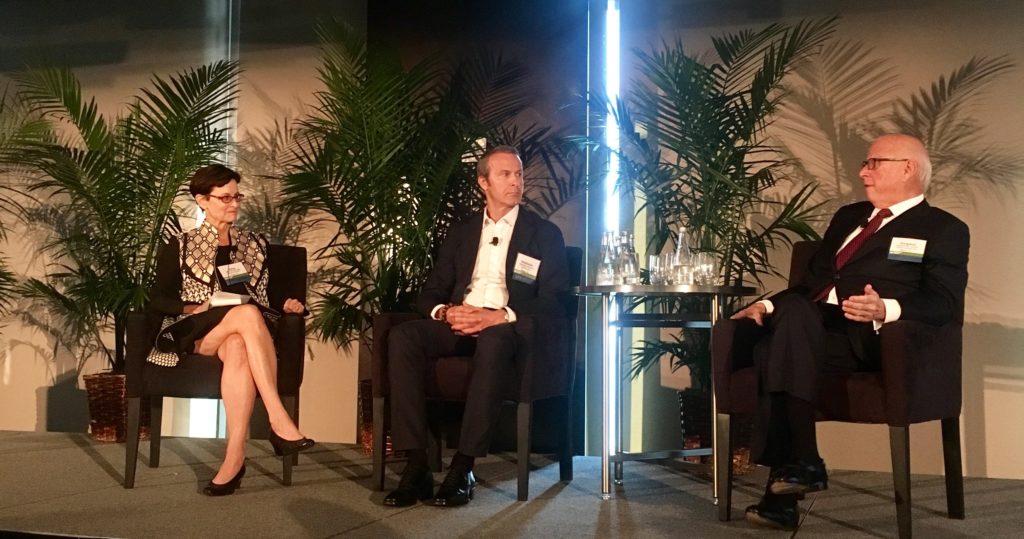
Chairman Chat: Vladislav Doronin and Howard M. Lorber discuss Miami Real Estate at the ULI Symposium. The conversation was moderated by Jane Wooldridge, Business Editor of Miami Herald.
December 19, 2016
By Nicole Martinez
Traditionally one of America’s largest condo markets, Miami’s urban center has experienced a luxury condo boom since the real estate crisis of 2008. Fueled largely by international buyers, luxury condominium developers have raced to cash in on Miami’s furiously active market.
As an additional 15,000 new luxury units stream into the downtown Miami market this current real estate cycle, the influx of new inventory combined with weaker foreign currencies and shifting political ideologies both domestically and abroad is causing an inevitable adjustment. Amid reports that luxury condo sales are slowing, many developers and real estate speculators are wondering whether Miami is perched on the edge of another recession. Or will Miami remain one of the world’s strongest condo markets?
According to a panel of experts at ULI’s Southeast Florida/Caribbean Miami Condo and Community Development Symposium, held in November at the brand-new Brickell City Centre, Miami’s luxury condo market remains healthy despite a temporary stall. “Miami is luxury centric, and we’re still in good shape,” says Howard M. Lorber, president & CEO of Vector Group Ltd. and the chairman of Douglas Elliman Realty. “The market has slowed, but pricing is part of issue. Sellers need to adjust their expectations and realize that the market has cooled due to new inventory.”
The three-panel event welcomed industry veterans like Jorge Perez, the chairman of The Related Group, and Ugo Colombo, founder of CMC Group and the visionary developer credited with igniting the Brickell condo boom. Foreign developers like Moishe Mana, who is steadfastly buying up chunks of property in Miami’s urban centers and Vladislav Doronin, the Chairman and CEO of OKO Group currently developing Missoni Baia in Miami’ s Edgewater neighborhood, also weighed in at Wednesday’s event.
Most agree that Miami offers a lot of advantages to both developers and buyers alike. A favorable tax climate, a surplus of underdeveloped land and a sexy, high-end image as a global city attracts plenty of luxury consumers to its shores. But the city also has its drawbacks: poor infrastructure and job growth, a lack of renowned public or private education and limited access to Asian buyers are issues facing Miami’s luxury condo market.
Though the current cycle of condos coming to market may experience a slight slump— which almost all agree could be attributed to overpriced units, anxiety during the election cycle, and the bygone threat of the Zika virus invading Miami—Lorber suggests that developers looking to sell more units should focus on differentiating themselves from the rest. “With so much new product being delivered, you have to do something new,” he says. “You have to do something special—upgraded amenities, waterfront location, add public spaces filled with contemporary art.”
Neil Fairman, president and founder of The Plaza Group, which recently unveiled its third condominium project in Miami, says differentiating his latest project from his prior developments was key to selling off units. “With Marina Palms, we chose to focus on building a community around a marina, and that served us well,” he says.
The Related Group’s Jorge Pérez says branding is another way developers can drive sales for new projects. He points to the success of his SLS Hotel and Residences, which recently debuted in Brickell and has enjoyed marked success in international markets. “Branding can be using a great architect, a renowned interior designer or using art to promote your building,” says Pérez. “Luxury buyers want those amenities.”
Developers are additionally differentiating their products in Miami by entering emerging neighborhoods. Terra Group CEO David Martin says condo developers are noticing that buyers have become more community-conscious.
“Sixty to seventy percent of buyers are local empty nesters, and they’re looking for simplicity, efficiency, and walkability, ” says Martin. “We’re seeing little sub-cities come up in Little River, Wynwood, and Coconut Grove, and these neighborhoods are creating residential stock and office stock and defining their own DNA.” Martin’s Terra Group has emphatically entered these neighborhoods with new luxury condo products, including Grove at Grand Bay and Park Grove in Coconut Grove, and Eighty Seven Park in Miami Beach’s North Beach neighborhood.
Product differentiation will be extremely important for developers seeking to enter the Miami market with new projects in the next development cycle. Pre-selling units will become increasingly important as traditional lenders continue to shy away from issuing construction loans for projects that don’t have at least 50 percent of units sold.
Despite a lack of traditional financing, many non-traditional lenders are stepping in to pick up the slack, says Elliot Spitzer, the former Governor of New York and current head of Spitzer Enterprises. “I think we’re seeing a two-tiered system where lenders have become very careful,” Spitzer says. “Non-banks are stepping in with alternative financing methods, but the equity requirements for developers are greater than they used to be.”
Still, Miami’s luxury condo market remains a relatively affordable, low barrier-entry market for both developers and buyers. Doronin says he remains confident Miami will experience continued growth in the next two to three years, with an influx of Russian buyers “paying top dollar for projects with good locations and infrastructure.”
Mana adds that the city is currently investing in efforts to attract the technology industry and bring high-skilled, high-wage jobs to the market, which, in turn, will draw new international buyers. Nearly all of the panelists urged the importance of opening more flight routes to Miami from Asia in an effort to attract Asian buyers.
Though the panelists remain cautious, ultimately they’re optimistic that Miami will avoid a real estate recession and continue to grow as the market stabilizes. The key, says Colombo, is being smart. “The most important thing is to not overgrow, and I don’t think were on the path to that,” he says. “I think people have learned their lessons.”
Read the full article here: http://urbanland.uli.org/development-business/access-public-spaces-waterfront-locations-driving-healthy-luxury-condo-market-south-florida/